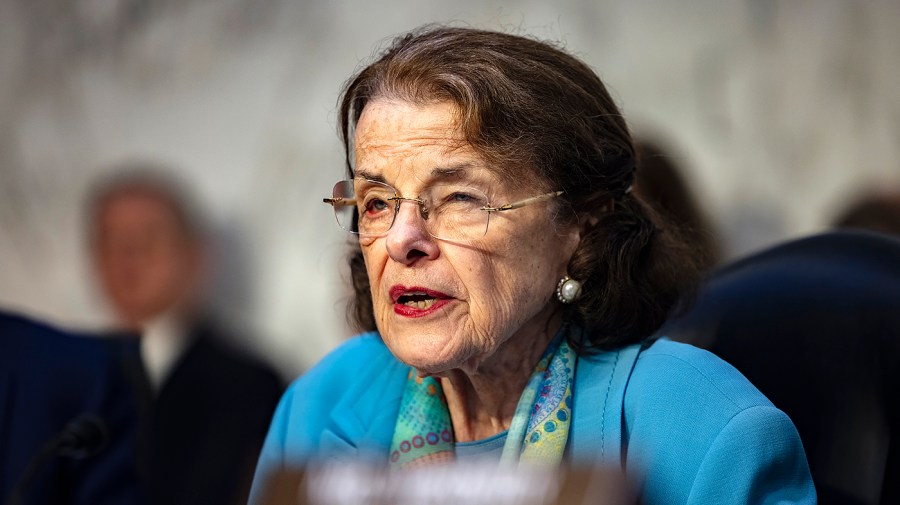At what point should human decency and compassion trump the political and ideological needs of those in power?
Last week, 90-year-old Sen. Dianne Feinstein (D-Calif.) appeared confused and had to be coached to vote “aye” during a Senate Appropriations Committee hearing on the $831 billion Defense Appropriations bill. Feinstein had started reading a statement instead of voting.
“Say aye,” Washington Sen. Patty Murray instructed the suddenly silent Feinstein. Murray then repeated herself three times before an aide came to Feinstein’s side and whispered into her ear.
“Yeah,” Murray stressed again. “Just say ‘aye.”’
That troubling incident followed 81-year-old Senate Minority Leader Mitch McConnell ((R-Ky.) suddenly appearing to freeze in mid-sentence during a weekly GOP leadership news conference and going silent for approximately 20 seconds before being walked away.
Beyond those two examples, we have the escalating worries swirling about 80-year-old President Joe Biden based upon his continued verbal and mental gaffes and miscues. They have sadly happened with such frequency that one need only google “Biden senior moments” to view dozens of them.
Leaving the political class, but staying within the highest ranks of our government, we pivot to the Supreme Court. Back in 2020, Justice Ruth Bader Ginsburg — a hero to so many on the left — passed away at the age of 87. While hero of the left she may have been, because of her passing, then-President Donald Trump was able to name her successor: conservative Justice Amy Coney Barrett.
To be sure, some on the left felt that Ginsburg should have retired while Barack Obama was still president in order to give him the chance to appoint a much younger, equally liberal justice to the court. Ginsburg heard those voices but declined to heed them.
But by refusing to let go, did Ginsburg ultimately help to unravel parts of her own life work while shifting the balance of the Supreme Court significantly to the right? Did her advanced age impair her judgment?
At some point every one of us will age out. It is the natural progression of life. That said, shifting back to the greater world of politics and government, while some try to hang on to the bitter end, others could be seen as staying in power only to satisfy the personal, partisan or selfish needs of others around them.
With the four examples of Feinstein, McConnell, Biden and Ginsburg — out of many more who could be listed, such as 83-year-old former House Speaker Nancy Pelosi and 89-year-old Republican Sen. Chuck Grassley — we have enough background to at least ask some necessary if uncomfortable questions.
First: At what point does cruelty enter the equation? It is clear that Joe Biden, like Ruth Bader Ginsburg before him, decided that he wants to stay in office. Fine.
But should he stay in office? Is that the best option for him and his health? Is that the best thing for our nation?
I have heard multiple Democrats say that Biden has to stay in office for as long as humanly possible so that, first, Vice President Kamala Harris does not succeed him, and second, the Democratic National Committee has time to open the primary to candidates such as California Gov. Gavin Newsom.
While some might be offended by the very idea of such a calculation, those conversations are taking place. Again, is any of that in the best interests of the physical and mental wellbeing of President Biden? Of course not.
Next, we go back to the examples of Feinstein and McConnell. No one I have spoken with from either party believes Feinstein is fit for office. That said, before she can be replaced, more political and personal calculations have to be made. Is such a delay in the best interest of Feinstein’s physical and mental wellbeing? Of course not.
Then we have Republican McConnell, the man who not only froze in mid-sentence but had two serious falls prior to that health scare. One of the falls resulted in a concussion and a cracked rib.
McConnell is from Kentucky. Whoops.
The governor of Kentucky is Democrat Andy Beshear. The Seventeenth Amendment tells us that if a senator leaves office due to death, resignation or expulsion, the governor of said state is empowered to appoint a replacement to complete the term or to hold office until a special election can take place.
Gee, what are the odds that Democrat Beshear appoints a Democrat to replace McConnell should he leave office early?
McConnell is not up for reelection until 2026.
“Wait a minute,” some GOP powerbrokers might be screaming. “Surely old Mitch can hang on a bit longer. We can’t allow a Democrat to replace him with a Democrat.”
Now, would such a scenario be good for the physical and mental wellbeing of McConnell? Of course not.
But … here we are. Our elderly political class is either making decisions that may not be in their best interests or — much worse — others are making decisions for them for partisan or professional reasons.
What to do?
More and more Americans are warming up to the idea that we need to have cognitive tests for any politician over the age of 75 as well as creating term-limits for our permanent politician class.
Will such testing become a part of our political process? Hopefully. But in the meantime, there are enough examples walking (and wheeling) around Washington, D.C., to tell us that something has to be done as soon as possible for the good of that elderly political class — as well as our country.
Douglas MacKinnon, a political and communications consultant, was a writer in the White House for Presidents Ronald Reagan and George H.W. Bush, and former special assistant for policy and communications at the Pentagon during the last three years of the Bush administration.
